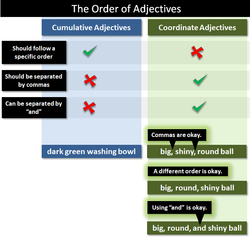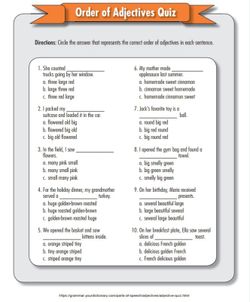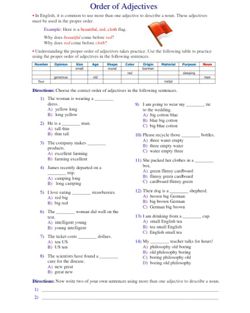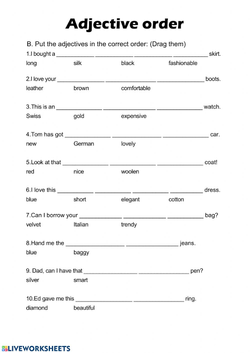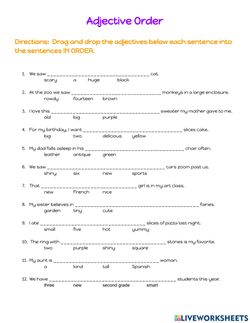Feb 22, 2022
Order of Adjectives Notes
ORDER OF ADJECTIVES
☆Order etymologically(study of words) means "row, line, rank, series, pattern, arrangement, routine." Origin: Latin
☆ Of means "off, from, down." Origin: Old Norse/Dutch/German
☆ Adjective means a "word used to qualify, limit, or define a noun or noun-like part of speech." The purpose of an adjective is to add or increase the noun. Origin: Old French/Latin
● Order of Adjectives = the arrangement of words that define a noun
📌This means:
->When we use more than one adjective before a noun in English, we often put the adjectives in a specific order.
🤷♂️WHY?
Why is it:
🦊Little Red Ridinghood and the Big Bad wolf instead of "Red little Ridinghood and the Bad Big wolf?
🐷Or the three little pigs instead of "the little pigs three?"
🛌Or Sleeping Beauty instead of "Beauty sleeping"?
Because...
1. It sounds right
Big Bad Wolf vs Bad Big Wolf ( the first physical attribute we recognize about an object is size)
2.They help to contract sentences in a sensible manner.
For example:
If we are talking about an incident, an event or a person...
-> The concerned parents = parents who were worried
-> The parents concerned = parents who were involved or mentioned
The present people= the people who are here/there
The people present = the people who were presenting or proposing an idea/representing a group
A responsible person = a person who is sensible and reliable
The person responsible = the person who is to blame
USES
👨🎓Academic writing
🗞News
👩💻 Literature
🗣 Spoken English
RULES
✅ Order of adjectives are also known as cumulative adjectives (adjectives that build on one another to modify a noun).
✅The order of adjectives is preceded by determiners e.g. possessives (my, mine our, your,his,her, their), articles (the, a, an), demonstratives (this, that, those, these), quantifiers (a few, enough, many, a little, most, some, any, some of), interrogatives (what, whose and which) etc.
✅ It is concluded by a noun (because the purpose of the adjective is to define the noun).
✅ Despite the order, not more than two or three adjectives are usually used to describe a noun.
✅ They are not separated by a comma in a written sentence because they function as a unit.
SO, WHAT IS THE ORDER?
🔢 Number/Quantity e.g. whole, half, several, A lot, A few, many, three, 100, etc
💡Opinion e.g tasty, strong, ugly, costly, stubborn, etc
📏Size e.g. small, little, petite, big, gigantic, etc
🔞Age e.g. young, old, ancient, adolescent, youth, 14 years old, adult, child
💠Shape e.g. square, round, skinny, triangular, etc
🌈 Colour e.g. black, yellow, blue, etc
🌍Origin e.g. British, Chinese, Korean, American, etc
👩🏭 Material e.g. wooden, woollen, silk, nylon, plastic, aluminium, etc
🔄Purpose e.g. writing (paper), dress shoes (formal dinners), clothes pin (hanging clothes on a line), postage stamp (stamp for sending letters), etc
🤓MNEMONIC: NOSAS COMP
💔EXCEPTIONS
☆Coordinate adjectives - these are adjectives which are equal in weight and can be looked at individually. The characteristics of coordinate adjectives are:
1. Are separated by commas;
2. Can be separated by "and," "as well as," and;
3. Can be followed by a linking verb (although this is not the most concise way of writing)
Examples
• The spider was bright and green.
• A good meal ensures a healthy as well as a nutritious start to the day.
• The brown chameleon appears to have changed its colour to a neon green hue.
